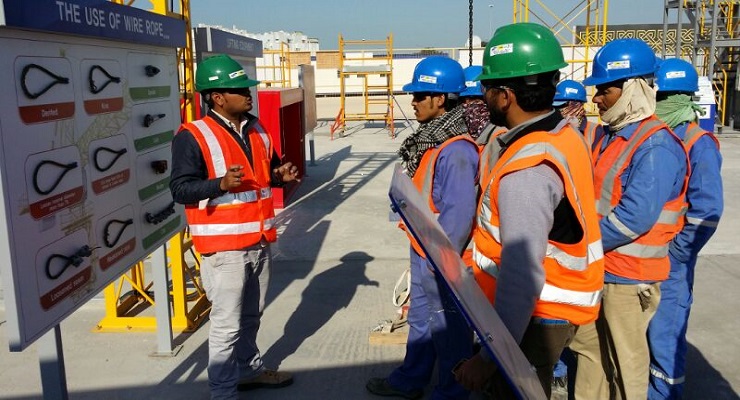List of Industrial Safety Training by TheSafetyMaster

Training on First Aid by TheSafetyMaster
September 26, 2023
Safety E-Learning Portal www.thesafetyguru.online, division of TSM TheSafetyMaster P Limited
September 27, 2023Behavior Based Safety
Behavior-Based Safety (BBS) is a proactive approach to industrial safety that focuses on observing, analyzing, and modifying employee behavior to prevent accidents and promote a safer work environment. The SafetyMaster recognizes the significance of BBS as a powerful tool in reducing workplace incidents and believes in its potential to revolutionize safety culture.
By utilizing BBS techniques, companies can create a positive safety climate where employees actively engage in safe work practices. The SafetyMaster’s expert trainers provide comprehensive BBS training programs that educate individuals on identifying unsafe behaviors, understanding their underlying causes, and implementing effective corrective measures. Through these programs, employees learn how their own actions can directly impact the overall safety performance of their organization.
Forklift Safety
When it comes to industrial safety, forklifts play a crucial role in warehouses and manufacturing facilities. TheSafetyMaster offers comprehensive forklift safety training programs that equip employees with the necessary skills and knowledge to operate these powerful machines safely.
Our forklift safety training covers a wide range of topics, including proper vehicle inspection, load-handling techniques, and safe driving practices. We emphasize the importance of maintaining clear visibility while operating a forklift and provide guidance on maneuvering in tight spaces.
By participating in our forklift safety program, employees gain confidence in their abilities to handle heavy loads without compromising the well-being of themselves or their colleagues. They also learn about potential hazards such as tip-overs or collisions and how to mitigate them effectively.
We believe that investing in forklift safety training not only improves workplace efficiency but also fosters a culture of responsibility and care. Together, let’s create a safer environment where everyone can thrive!
First Aid
In any workplace, accidents and injuries can occur unexpectedly. Having a well-trained team in first aid can make a significant difference in saving lives and minimizing the impact of an incident. TheSafetyMaster offers comprehensive first-aid training programs that equip employees with the necessary skills to respond effectively to medical emergencies.
During the first aid training, participants learn essential techniques such as cardiopulmonary resuscitation (CPR), wound management, fracture stabilization, and basic life support. They are also educated on identifying common workplace hazards and potential risks that could lead to accidents. By empowering employees with first aid knowledge, TheSafetyMaster ensures that they are prepared to handle emergencies promptly and confidently.
Fire Fighting
When it comes to industrial safety, fire can be one of the most devastating hazards. The safety master understands the importance of equipping employees with the necessary skills to combat and prevent fires effectively. Our comprehensive firefighting training program focuses on developing practical knowledge and techniques that can save lives and protect valuable assets in the event of a fire.
During our fire fighting training, participants will learn about different types of fires, proper handling of fire extinguishers, techniques for evacuating workers safely, and strategies for preventing fires in the workplace. Our expert trainers will guide participants through simulated scenarios, ensuring they gain hands-on experience in extinguishing fires using various firefighting equipment. By fostering a proactive approach to fire safety, TheSafetyMaster empowers individuals to protect themselves and others against this potentially catastrophic threat.
Emergency Response
In the realm of industrial safety, a well-prepared and efficient emergency response system can mean the difference between life and death. The SafetyMaster understands this critical aspect and provides comprehensive training programs to equip individuals with the knowledge and skills necessary to respond effectively in emergency situations.
During TheSafetyMaster’s Emergency Response Training, participants are immersed in a simulated environment where they learn how to handle various emergencies such as fires, chemical spills, medical emergencies, and natural disasters. Through hands-on exercises, they acquire practical skills like first aid techniques, evacuation procedures, hazard identification, communication protocols, and coordination with emergency services.
The goal of this training is not only to ensure the safety of employees but also to foster a sense of confidence and preparedness within individuals. By arming them with the necessary tools to handle emergencies, TheSafetyMaster empowers organizations to create a secure work environment that prioritizes the well-being of its workforce.
Work at Height, Scaffolding Safety
Work at height is an integral part of many industrial operations and construction projects. However, it presents significant risks that demand careful attention and adequate training. The SafetyMaster offers a comprehensive training program on work at height and scaffolding safety to equip individuals with the necessary knowledge and skills to perform their tasks in elevated environments safely.
With a strong emphasis on ensuring the well-being of workers and minimizing accidents, TheSafetyMaster’s training program covers various aspects of work at height. Participants will learn about the proper use of personal protective equipment (PPE), including harnesses, lanyards, and helmets, to secure themselves while working at elevated positions. They will also gain insights into best practices for erecting and dismantling scaffolding structures, ensuring stability and compliance with industry standards.
The program’s modules delve into hazard identification and risk assessment techniques specific to working at heights. Trainees will understand how to identify potential hazards associated with different environments and devise effective control measures to mitigate those risks effectively. Additionally, they will be trained in emergency response procedures for incidents that may occur during work-at-height activities.
By investing in TheSafetyMaster’s work at height and scaffolding safety training, companies can foster a culture of safety within their workforce while adhering to legal obligations regarding occupational health and safety standards. Ultimately, this proactive approach not only helps prevent accidents but also contributes to increased productivity as employees carry out their duties confidently without compromising their well-being.
HAZOP Training, Process Safety Management Trainings, Process Hazard Analysis Training
HAZOP (Hazard and Operability) training is a crucial component of industrial safety that focuses on identifying potential hazards in processes and operations. The SafetyMaster offers comprehensive HAZOP training programs that equip employees with the necessary knowledge and skills to identify, analyze, and mitigate risks effectively. Through interactive workshops and practical exercises, participants learn how to conduct systematic evaluations of processes to prevent accidents, improve efficiency, and ensure compliance with safety regulations.
Process Safety Management (PSM) training provided by TheSafetyMaster are designed to enhance the overall safety culture within industrial facilities. These trainings delve into various aspects of managing process hazards, including risk assessment methodologies, control measures implementation, emergency response planning, and incident investigation techniques. By equipping employees with a deep understanding of process safety principles and best practices, these trainings empower them to foster a proactive safety approach that safeguards both personnel and assets.
Electrical Safety Training
When it comes to industrial safety, electrical hazards pose a significant risk in the workplace. To address this issue effectively, TheSafetyMaster offers comprehensive electrical safety training programs designed to equip employees with the knowledge and skills necessary to identify and mitigate potential electrical dangers.
During our electrical safety training courses, participants gain a deep understanding of the fundamental principles of electricity, including circuitry, voltage, current flow, and resistance. They learn about various types of electrical hazards such as electric shock, burns, electrocution, and fire caused by faulty wiring or equipment malfunction.
The SafetyMaster’s expert trainers guide participants through practical scenarios that simulate real-life situations involving electricity. This hands-on approach allows employees to apply their newfound knowledge in a safe environment while learning how to inspect electrical equipment for potential issues and implement preventive measures effectively. By emphasizing the importance of personal protective equipment (PPE), our training instills a culture of safety consciousness among workers.
By enhancing their understanding of electrical safety protocols and empowering them with preventative strategies, TheSafetyMaster’s electrical safety training ensures that employees can identify potential hazards proactively and take appropriate actions to prevent accidents. This not only minimizes injuries but also contributes to increased productivity as workers feel confident in their ability to perform tasks safely.
Industrial Safety Capability Development for Employees by TheSafetyMaster
When it comes to industrial safety, one of the key aspects that cannot be overlooked is the development of employees’ capability to ensure a safe work environment. The safety master understands the significance of equipping employees with the necessary skills and knowledge to mitigate risks and handle emergencies effectively. With their comprehensive industrial safety capability development programs, they strive to empower individuals to become proactive agents of safety within their respective workplaces.
The SafetyMaster’s industrial safety capability development programs are tailor-made to address the specific needs and challenges faced by different industries. Their team of experienced instructors employs various training methodologies, combining theoretical knowledge with practical hands-on exercises, case studies, and simulations. Through these engaging learning experiences, employees not only gain a deeper understanding of safety protocols but also develop critical thinking skills that enable them to identify potential hazards proactively.




